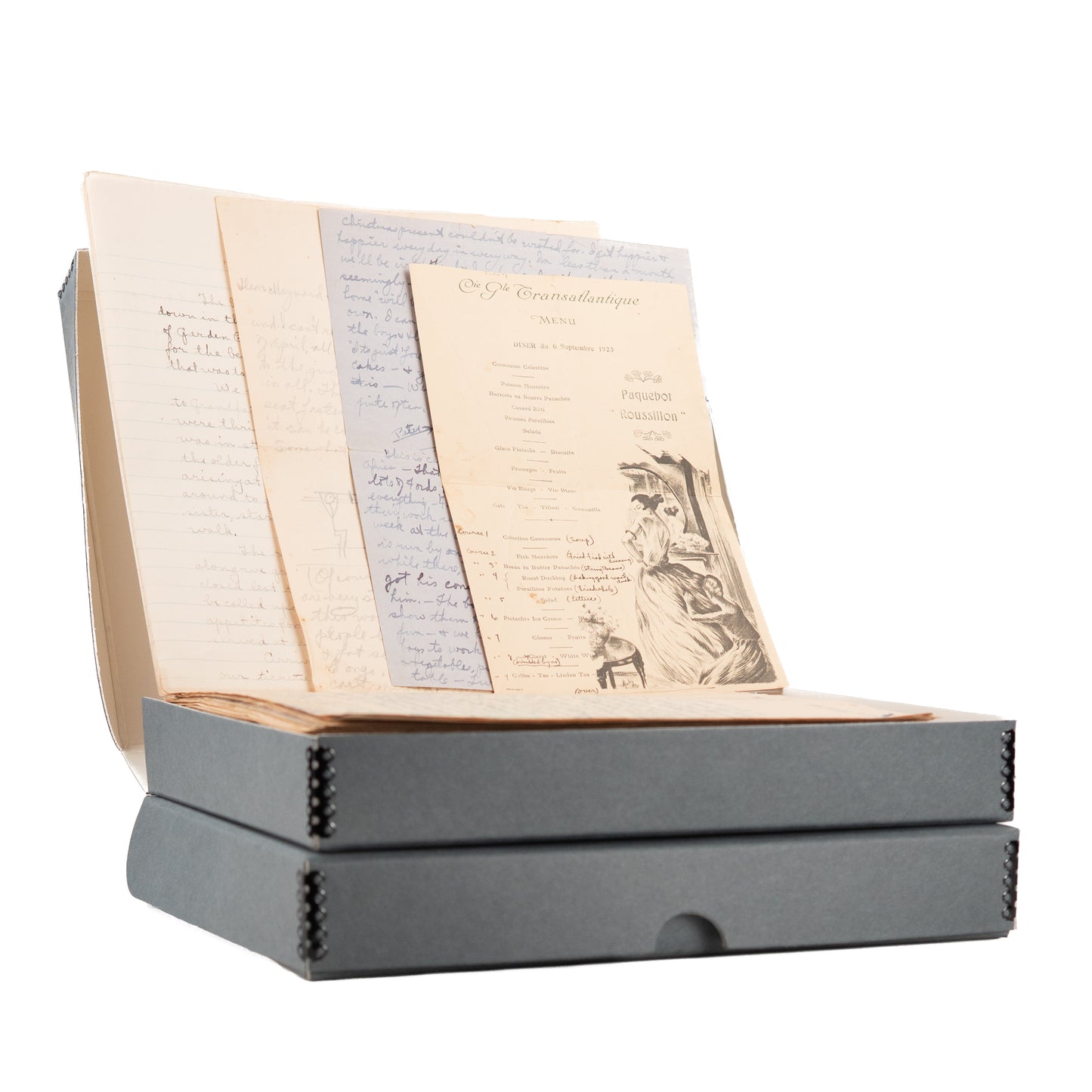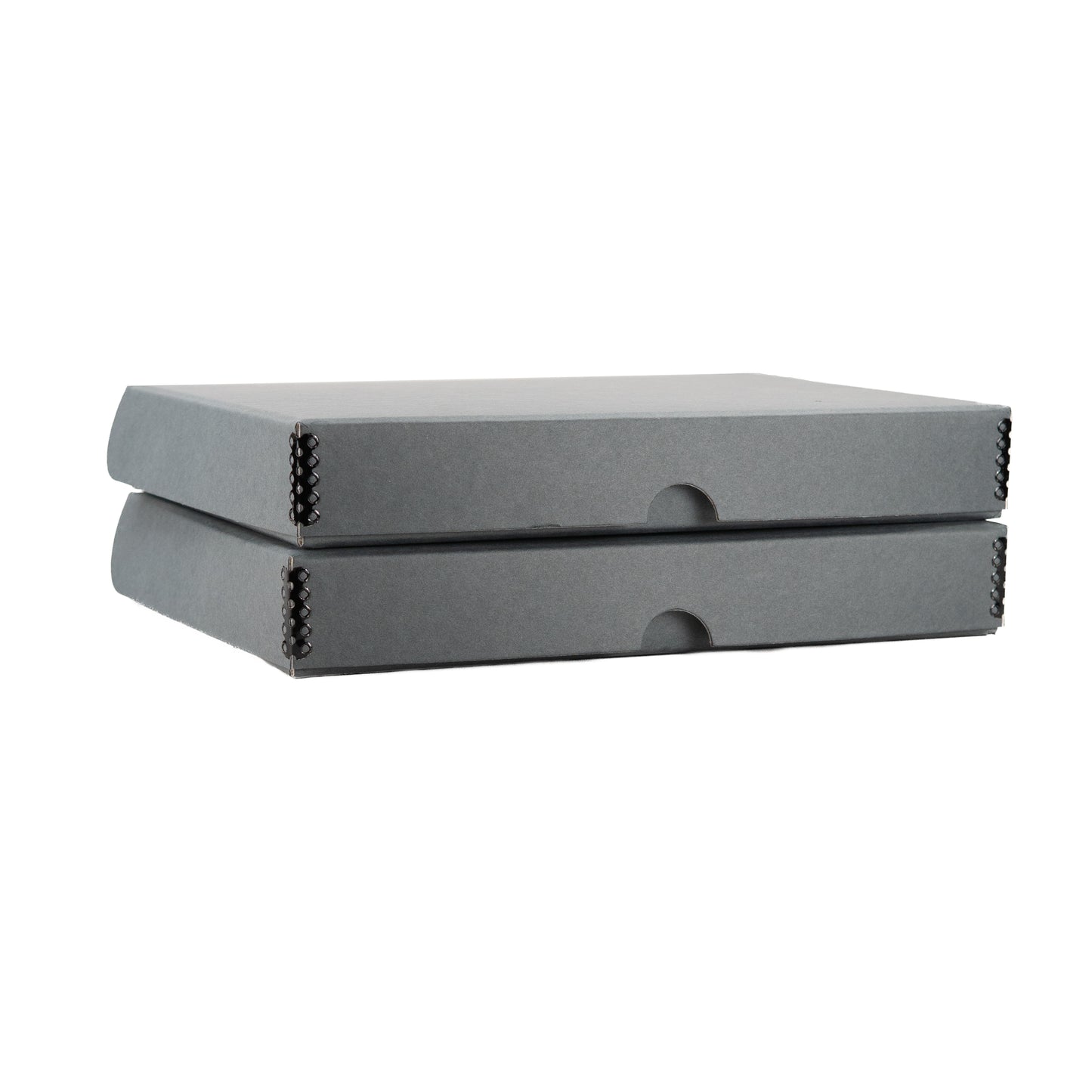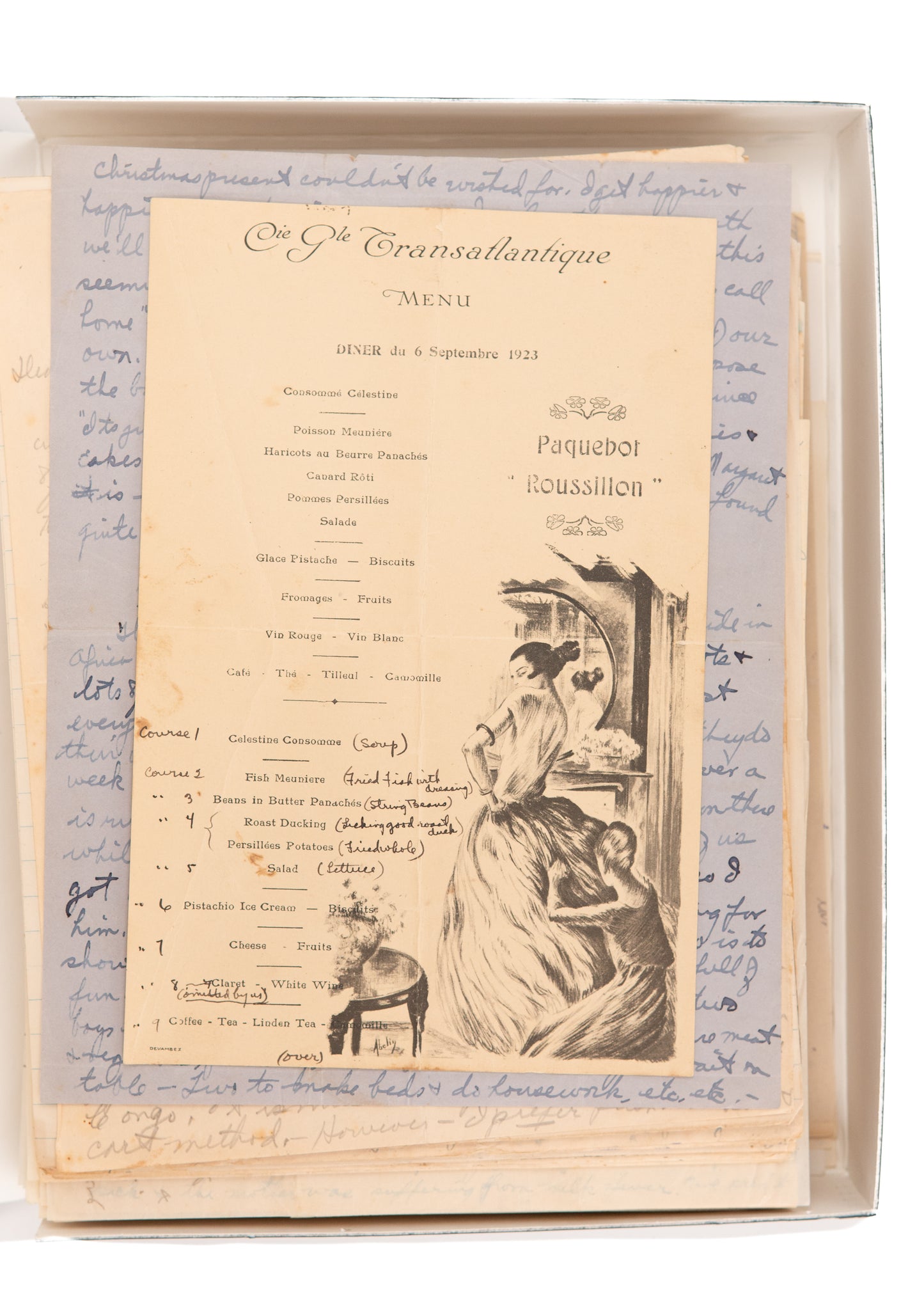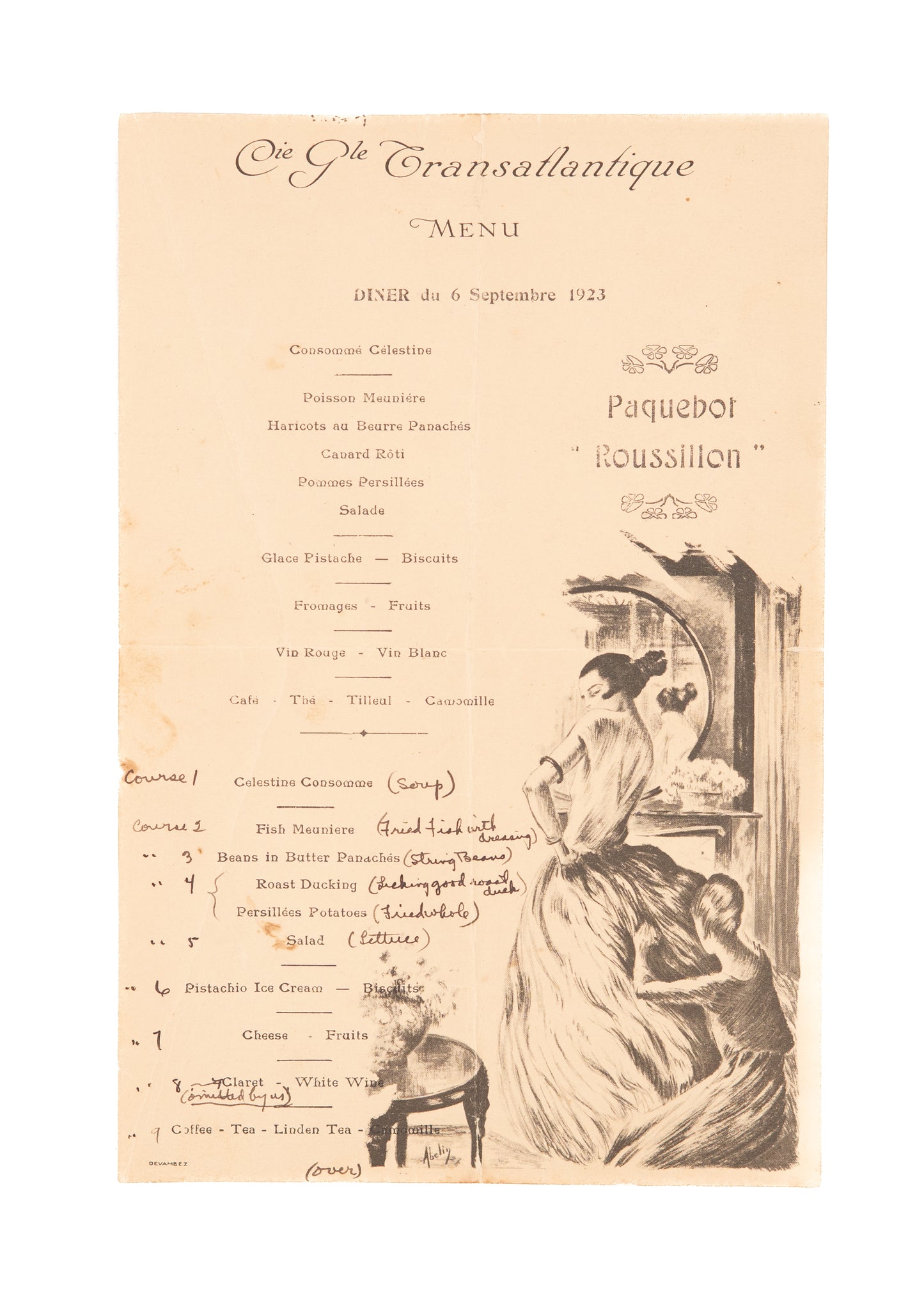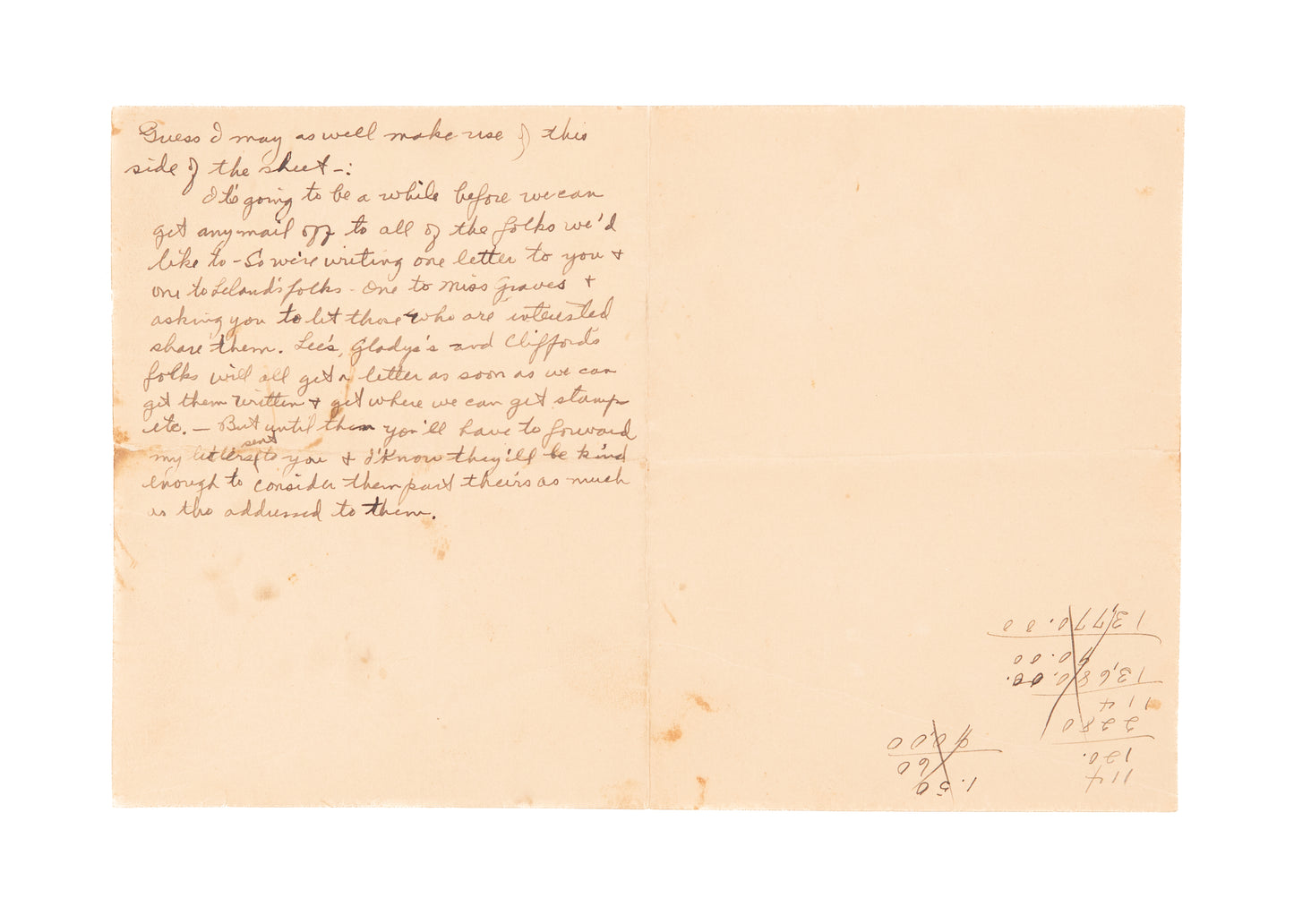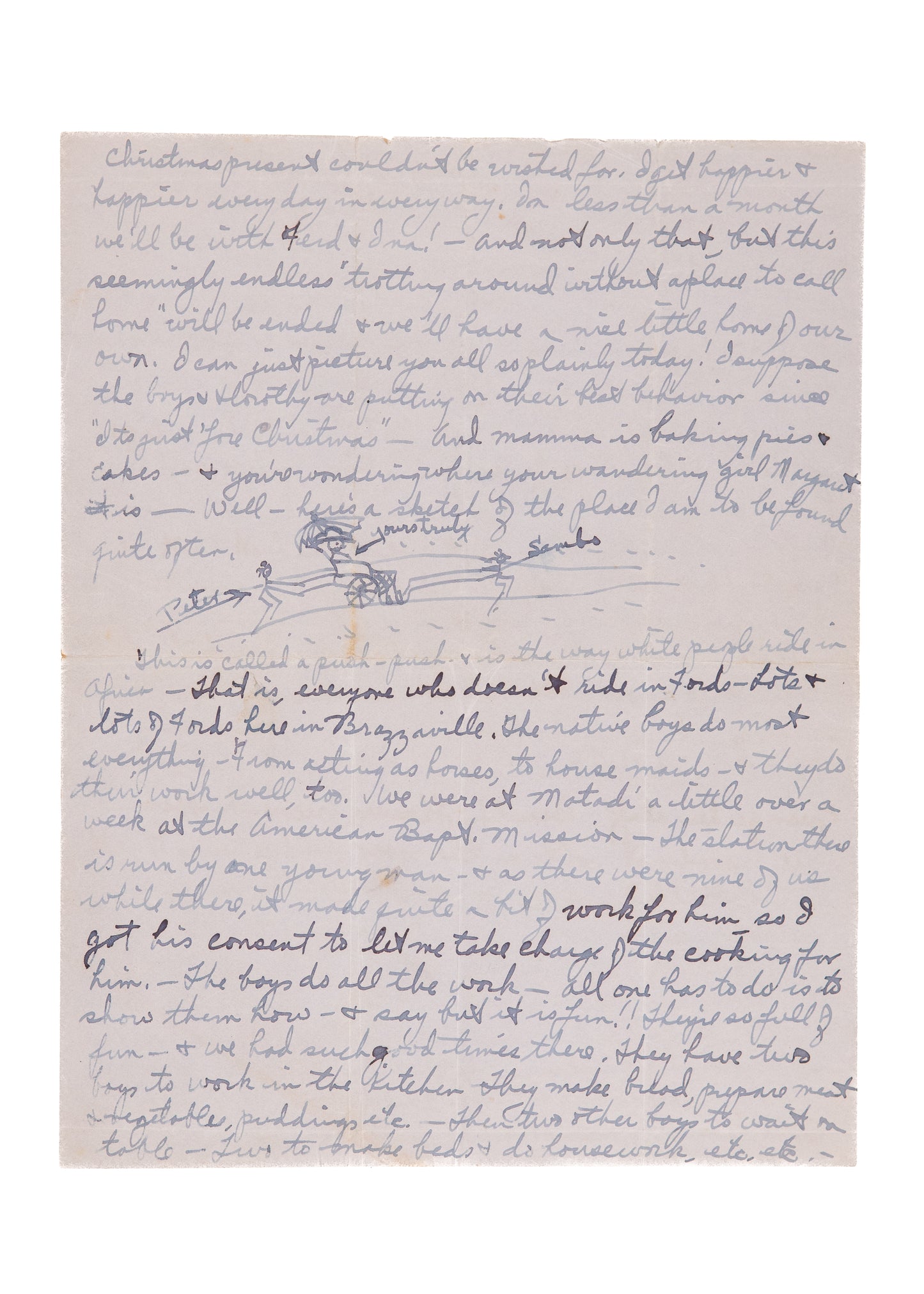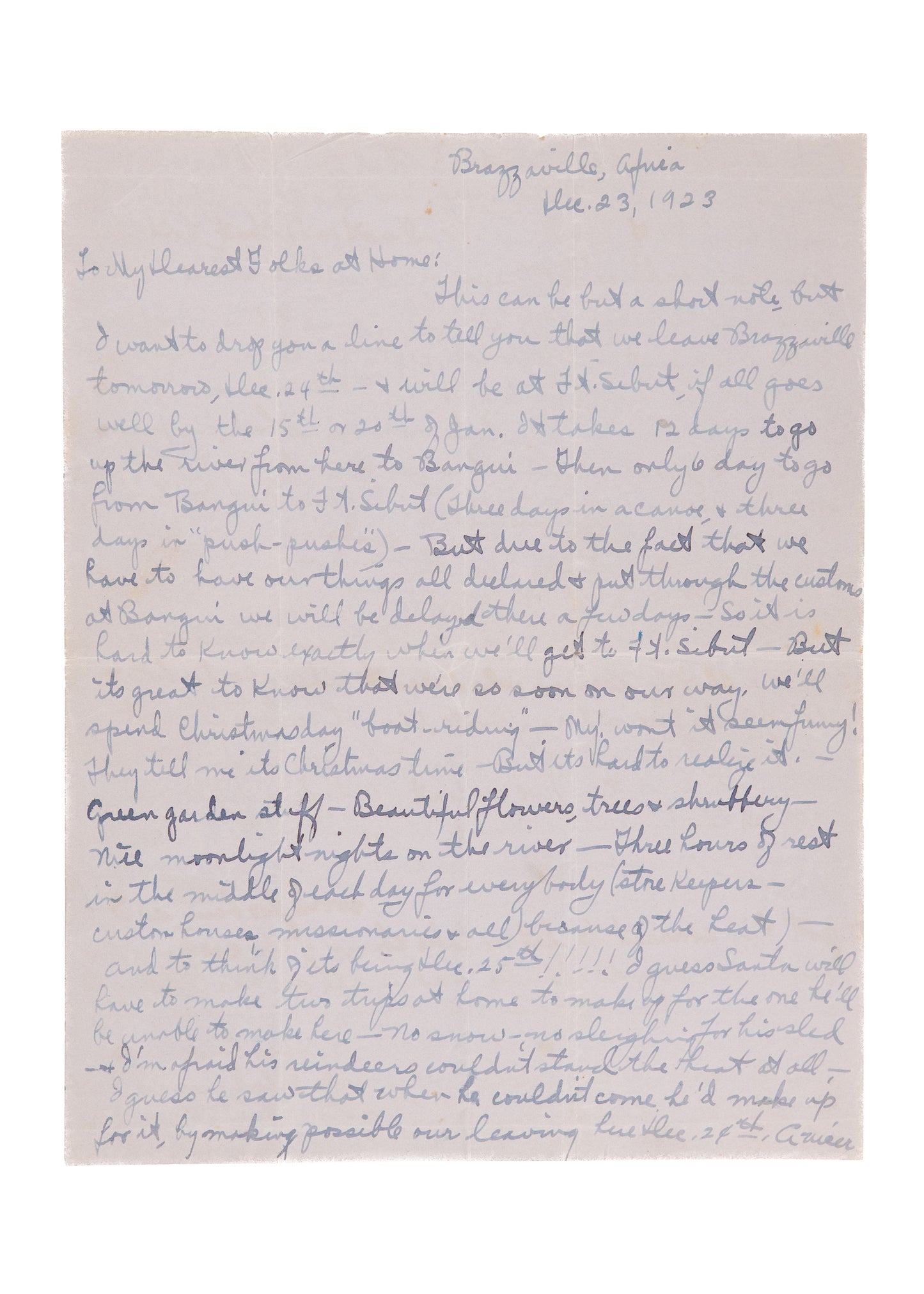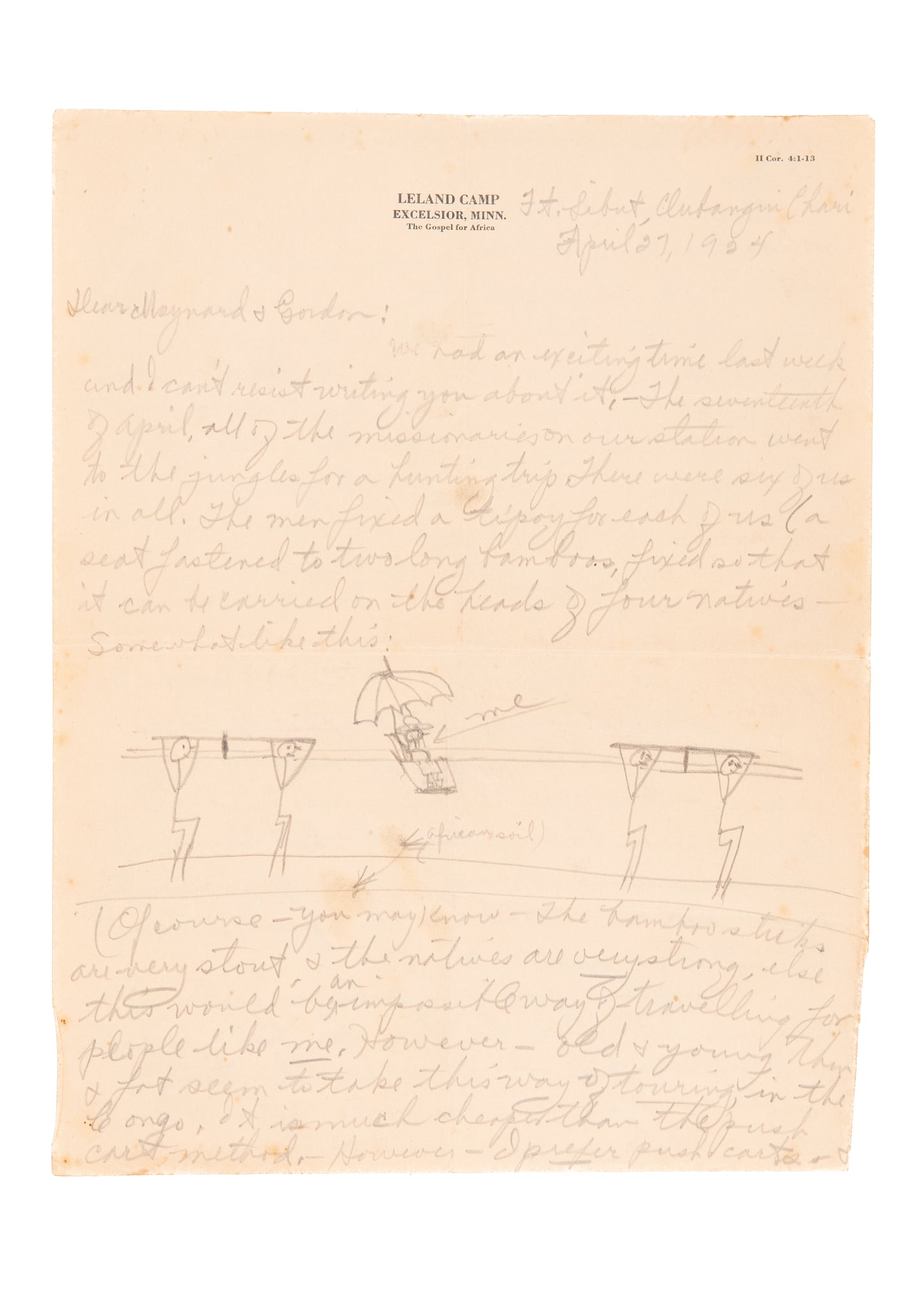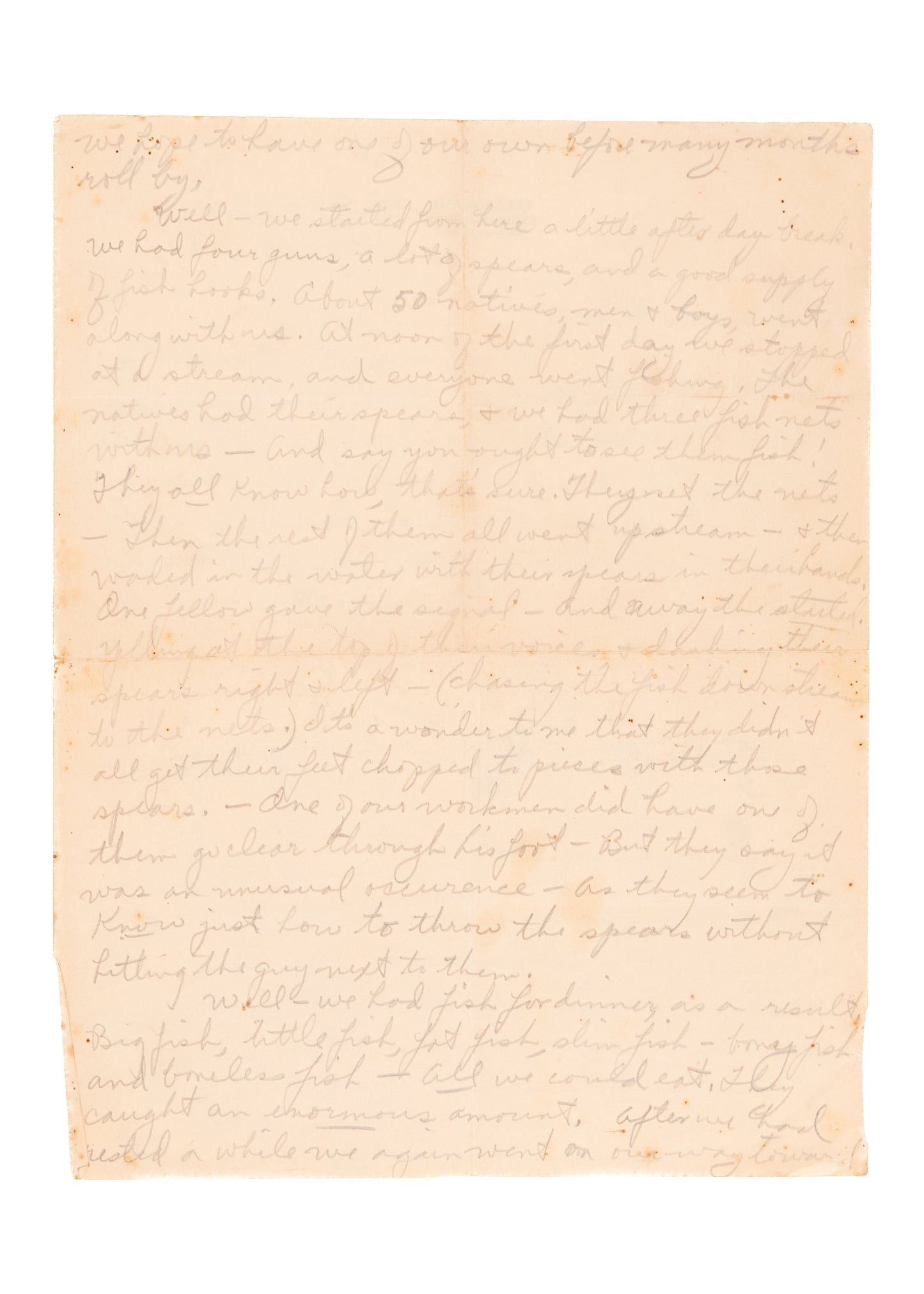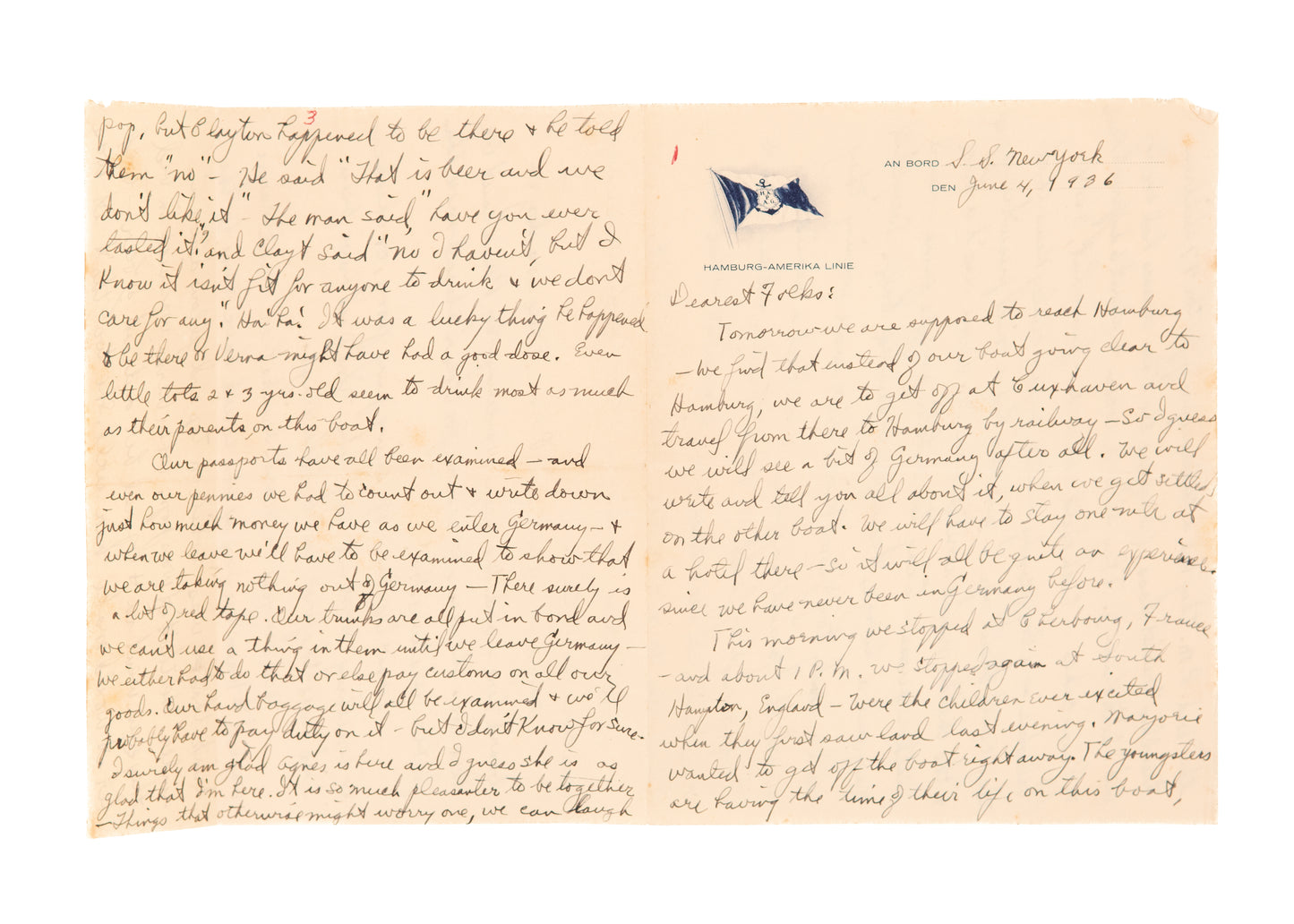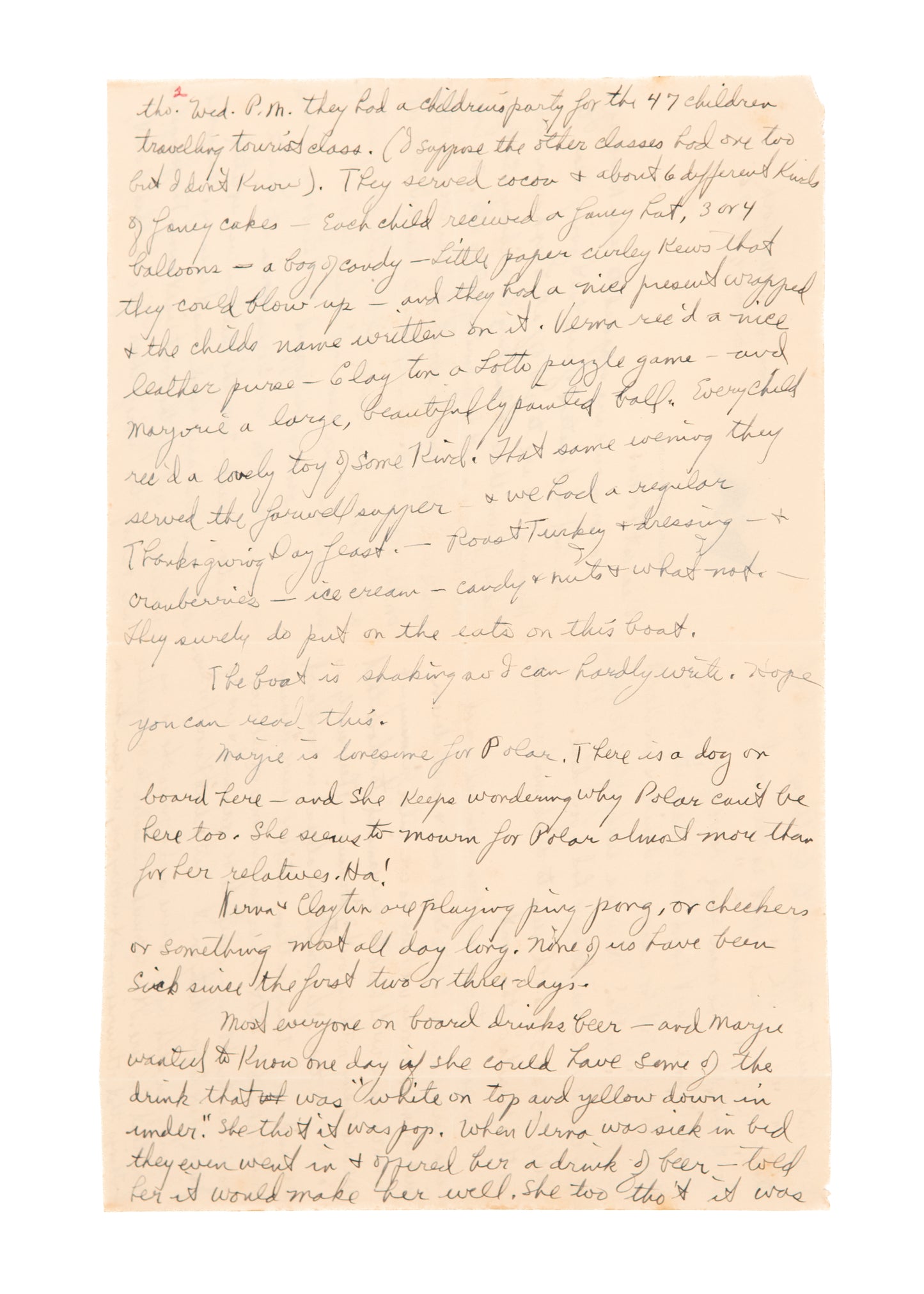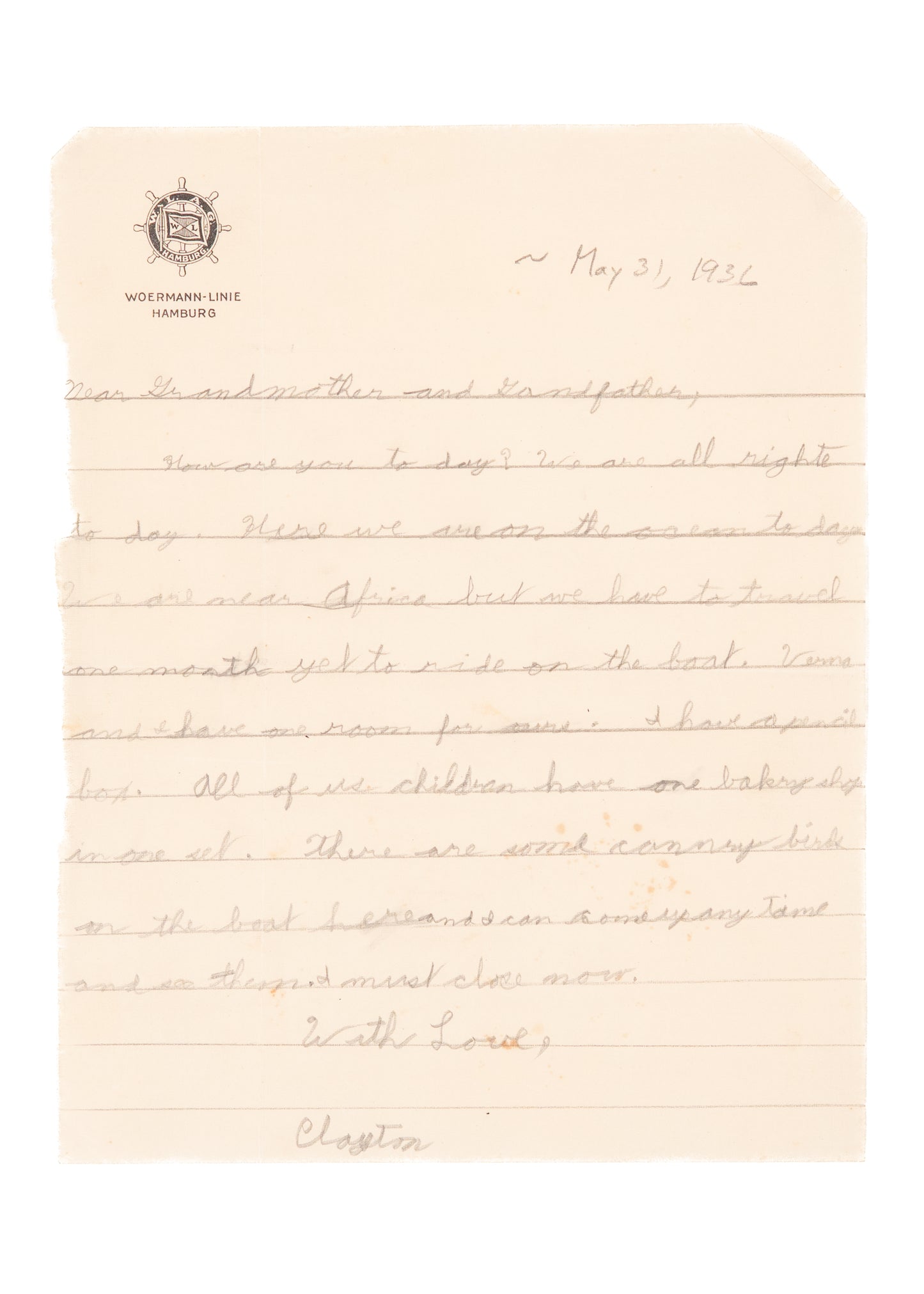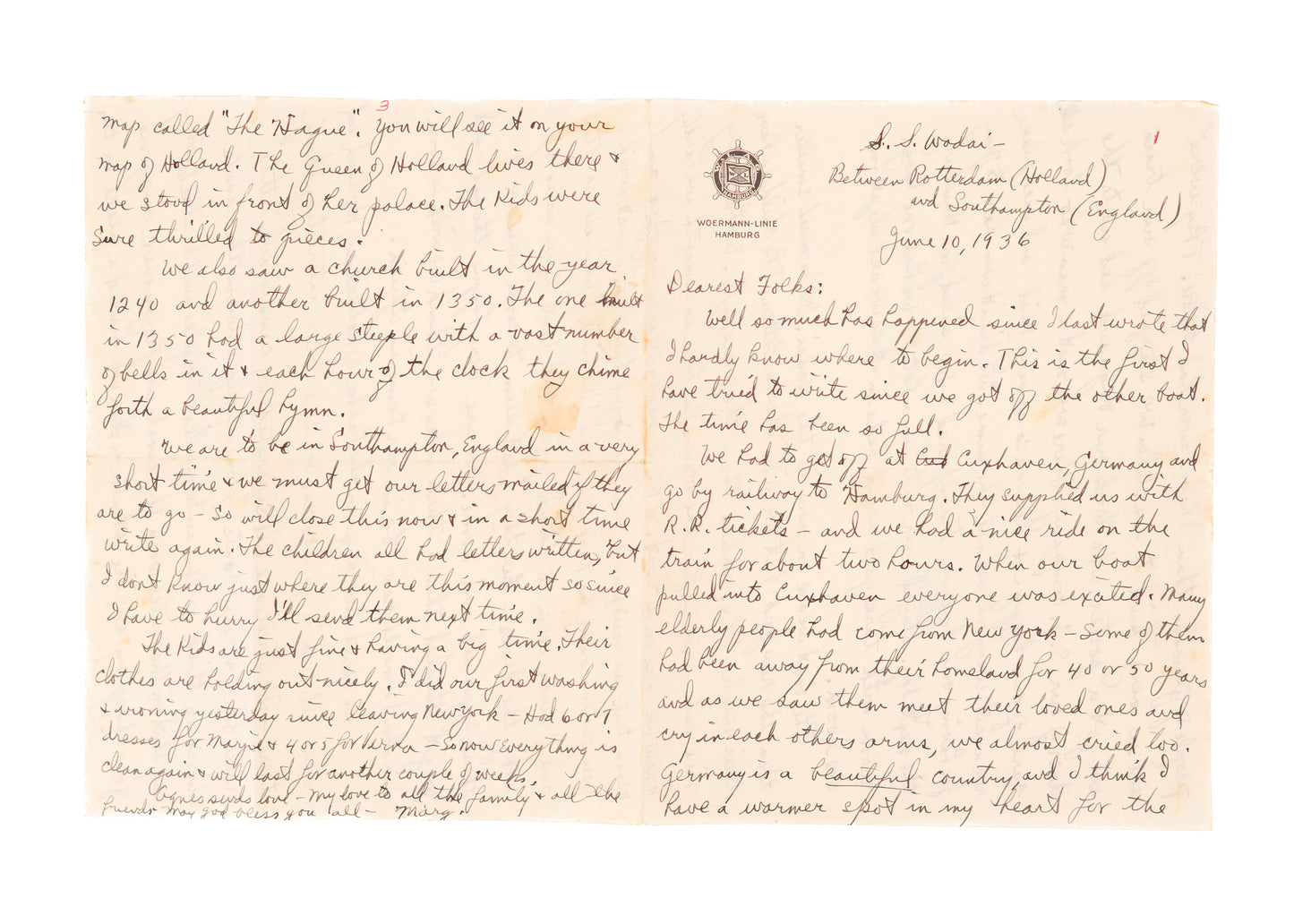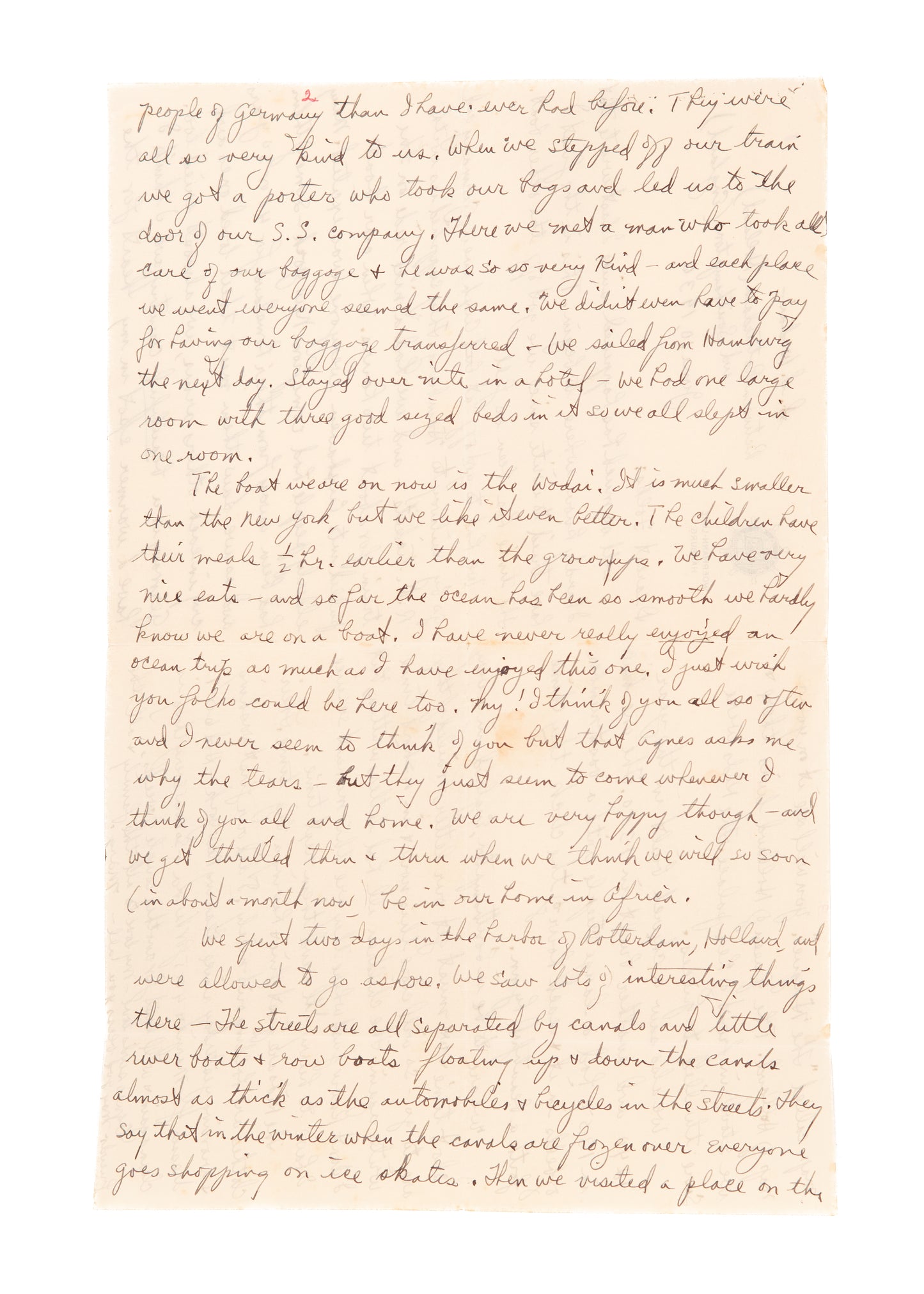Specs Fine Books
1920's LELAND & MARGARET CAMP. 1500+pp Archive of Baptist Missionary Correspondence. Friend C. T. Studd!
1920's LELAND & MARGARET CAMP. 1500+pp Archive of Baptist Missionary Correspondence. Friend C. T. Studd!
Couldn't load pickup availability
An absolutely incredible 1500+pp archive of journals and correspondence from pioneer American Baptist missionaries to Africa - contemporaries and brief co-workers with C. T. Studd!
The present grouping reflects one of the finest missionary correspondence archives we have seen come to market in many years, and from an important American Baptist missionary.
The authors of the letters are Mr. and Mrs. Leland and Margaret Camp, the items almost entirely composed by the latter. The Camps were among the very first missionaries to begin working with the then brand-new Baptist Mid-Missions, founded by the indefatigable William Haas in 1920.
Haas, a committed Baptist, originally sailed for Africa to work with the inter-denominational African Inland Mission. On his return, he found that many of the Baptist denominations had begun to forsake the “fundamentals,” so he created the Baptist Mid-Missions Agency as a safe haven for conservative Baptist missionaries. It was a true pioneering agency focused exclusively on sending missionaries to the unreached in Africa.
Haas’ pioneering spirit made him fast associations with C. T. Studd and Alfred Buxton of the Heart of Africa Mission. Studd noted, “Haas was a unique man in many ways, besides his restless zeal . . . He had an active brain, constantly planning schemes for the advance of the Gospel.”
There are excellent vignettes of the relationship between Studd, Buxton, and Haas below:
https://hayeshereandthere.com/tag/william-haas/
And an excellent account of the beginning of the mission, with a photograph of Haas with Leland and Margaret as they were about to set sail for Africa c.1923 here:
https://hayeshereandthere.com/tag/c-t-studd/
Leland and Margaret were among the very first to join Haas after graduating from Northwestern Bible and Missionary Training School [under W. B. Riley]. And from that perspective their correspondence provides almost unparalleled insight into the origins and spirit of the mission, etc., Haas died in 1924, but the mission continued to flourish and remains an effective sending agency today.
The 1500+pp untouched archive of correspondence includes extended portions of Margaret’s Diary, formal missionary correspondence from the Camps, itself seemingly not catalogued and available for research, and a very significant quantity of personal manuscript correspondence regarding the mission work, challenges of the mission, their spiritual lives, difficulties of missionary life, manuscript sermons delivered at higher life conferences, etc., Dates range from the earliest days of the 1920’s through to the end of their work in the 1950’s.
Of perhaps special interest is that Margaret appears to preach quite regularly, apparently to men, women, and children. My understanding of those associated with the Baptist – “Fundamentals” movement, i.e. W. B. Riley, etc., is that they were opposed to females preaching, especially to men. Perhaps they “infantilized” the Africans in a way that put them in the same category as women and children, thus making it more acceptable.
The material is presently in two full archival folios containing over 1500 pages.
Extracts:
“The promise that ‘the effectual fervent prayer of a righteous man availeth much’ came to me and I knelt in prayer, and in answer to my request that God would give me some further definite promise and assurance from His Word, the 4th verse of I John stood out above all else – ‘This is the victory that overcometh the world, even our faith.’ I thanked my Lord, closed my Bible and went downstairs to face the duties of the day lying before me. A calm confident trust seemed to fill my soul and I felt safe and secure in His care.”
“I shall never forget Dr. Pace delivered the message with “Consecration” for his subject. We were asked to gather, after his sermon, out on the lake shore. The evening was beautiful and as we stood by the lakeside singing our songs of love and of praise to our Lord, He Himself seemed to draw near, and His presence filled our souls to their depths. A new missionary friend, Mary Valkier, who is going to Africa under our mission board, was present, and she and I were each asked to speak a few words of praise and testimony. Then someone started the song, ‘I’ll go where you want me to go, Dear Lord,’ and as we sang, about fifteen young people stepped forward and gave their lives to God to be used as He should see fit. Truly our hearts burned within us as we walked home this night, realizing that the Lord Himself had drawn near and had been in our midst.”
“In response to a letter rec’d from Mr. Haas yesterday, asking us to meet him at Practical Bible Institute, Binghamton, New York. We left Gull lake and are now on our way east, our next stop being Cleveland, where we hope to meet Mr. Carman, American Director of our Mission Council.”
“How lovely the New York hills loomed up before my eyes in all their wondrous beauty as I awakened this morning. So fresh, so fragrant, and as beautiful! We have had a most blessed day. Arrived at P.B.T.S. at 9am and for the first time met the much-heard-of Mr. Haas, and have already learned to love him. We have also met the Wimers, a young couple who are to sail for France at the same time as we.”
“After leaving the depot Mr. Haas accompanied Leland and I to our room at the Alliance Home, and spent the evening with us. As we listened to the things they have told us concerning their different experiences in the Christian life we have been filled with a deep desire for a closer walk with God.”
“A big week spent in N.Y. City. The night I arrived, after leaving the depot, Mr. Carman, Mr. Has, Leland and I crossed the river on the ferry, and then took the underground to Times Square. As I came up from the subway and received my first view of N.Y. City at night, I was simply dazed at the blaze and glare which met my eyes. The others with me had been there many times before so they amused themselves by watching me in my greenness (which I fear was quite evident). Among the interesting places visited during the week were The Pallisades, Cone Island, Chinatown and two of its missions – Also Dr. Haldeman’s church. We have here met Mrs. Bayne, a colored nurse leaving for Africa at the same time as we, which, although I can hardly realize it, is tomorrow. A feeling of sadness, sweetened and made beautiful by deep joy and gratitude to God, comes as I think of leaving the U.S.A.”
“We pulled out of the N.Y. Harbor at 11am on the French boat, Rousillon . . . there are five in our party. Mr and Mrs. Wimer (better known as Ted and Lila), Mrs. Bayne, and Leland and I. Praise God for His grace and power, tonight. He has heard our prayers and has graciously answered. What joy to be called of Him!”
“I was generous enough to give the fish of the sea what breakfast I at yesterday” [on sea sickness]
“Word has been received that our boat isn’t to leave until tomorrow [Bourdeaux to Africa] and now tonight we are staying in a bedroom of a dirty low-down saloon, the only room in all La Pollice we could find. The better rooms were withheld from us because we are Protestants. The awful filth and ungodliness of this place, the unpleasantness of the circumstances, only reveal to us in a clearer way the contrast between Christ and sin – and makes us but rejoice in the salvation He has wrought for us. How much we have tonight in Him!”
“Our tickets on this boat are costing us more than had we gone on the boat from Bordeaux. We have but enough to get us to Matadi (one half of the way) – But knowing that it I is He who is leading, we have no fear.”
“Well – here’s a sketch of the place I am to be found quite often. It is called a push-push & is the way white people ride in Africa. That is, everyone who doesn’t ride in Fords. Lots and lots of Fords here in Brazzaville. The native boys do most everything, from acting as horses to house-maids & they do their work well too. We were at Madai a little over a week at the American Baptist Mission – The station there is run by one young man & as there were nine of us while there it made quite a bit of work for him. So I got his consent to let me take charge of the cooking for him. The boys do all the work – all one has to do is ot show them how - & say but it is fun!! They’re so full of fun - & we had such good times there. They have two boys to work in the kitchen. They make bread, prepare meat & vegetables, puddings &etc. Then two other boys to wait on table – two to make beds & do housework etc., They do their work always as good as any American housewife could do – The washing & ironing is always done better than I could do with the materials they use – cold water etc,. Yet the clothes are nice & white & very neatly pressed. My only worry is that I’ll become lazy. I’m not so sure but that I’m there already.”
“I remember Howdy used to tease & tease me to tell him ‘nigger’ stories – and I guess by the time I get home next time I will have all his little heart desires. His eyes sure would stick out at some things he’d see if he were here.”
“Miss Bonar & I went to some of the neighboring villages to preach & hold meetings. We went into tipoys and about fifteen native porters went with us to carry not only our clothes and food, but “us!” Poor men!!! The villages we visited happened to be in the leopard district, but the men build campfires all around our house & then slept on the verandas of the rest houses. For safety’s sake, Miss Bonar kept a spear by her bed-side & I kept a long native carving knife in under my pillow, so we had double protection – and of course in reality Triple protection as the most trustworthy of all was our Father’s eye of love, unseen, but felt.”
“Well, I made my first try at speaking to the natives in Sango language. They understood me, which I guess I the most important thing. But I sure realized my limited vocabulary & as a consequence am going to settle down to studying more than ever. The natives somehow seem so hungry for a little bit of love. Many of them don’t know what it is to have even human love in any way shown to them, to say nothing about the love of Christ. At one village, while just passing through it, about thirty youngsters came running out asking us to step to tell them how to get to the “City of God.” They said they’d never heard & they wanted so much to know. One little youngster asked us if we wouldn’t write his name in the book of God. My! You know my heart just goes out to them. They aren’t hard to love at all. They’re so cute & so hungry – like for even a smile or any little kindness.”
Etc., etc., etc.
Drawings are sprinkled throughout, including of Margaret being carried by Peter and Sambo [Africans]; of the Fort layout, etc, etc.,
Plus material related to the Gull Lake Baptist Conference; train rides to Michigan from Chicago; letters written on board the Rousillon; a beautiful lithographed menu from the Roussillon; extensive communication from Sibut in the Central African Republic; The Boysons [missionaries from Moody Bible Institute]; accounts of hunting expeditions – antelope, rhinoceros etc.; accounts of Margaret Camp and Miss Bonar going to preach in remote villages; their move to Ippy, complete manuscripts of sermons by Margaret Leland; furlough’s back in America, arrival of new missionaries, their move to Fort Crampel in French Equatorial Africa; yellow fever; poems by Margaret Camp; letters to their son Clayton who attended Columbia Bible College [South Carolina, to prepare for the Baptist ministry], the threatened martyrdom of native evangelist “Yemingui,” conversion of witch doctors, disc-lipped [duck-billed, she says] women of the Sara Kaba Tribe; the loss of a child in birth; on World War II in Africa; prayer meetings for the baptism with the Holy Spirit [after reading R. A. Torrey’s work]; their Furlough at home during the War and Margaret’s health issues [they were almost pulled from the field – she had malaria, etc.,]; Elephants, etc., etc., etc.,
This really doesn’t even scratch the surface. An important archive historically, worthy of intact preservation and someone’s PhD Dissertation or missionary biography in waiting.
Share
